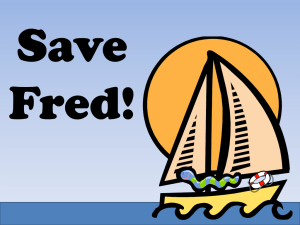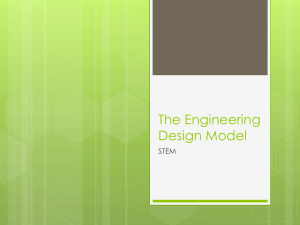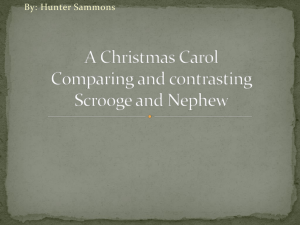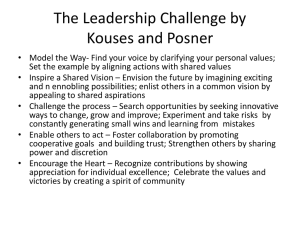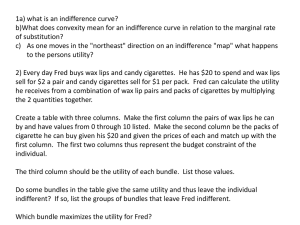Medicine-Is-Changing-Presentation
advertisement
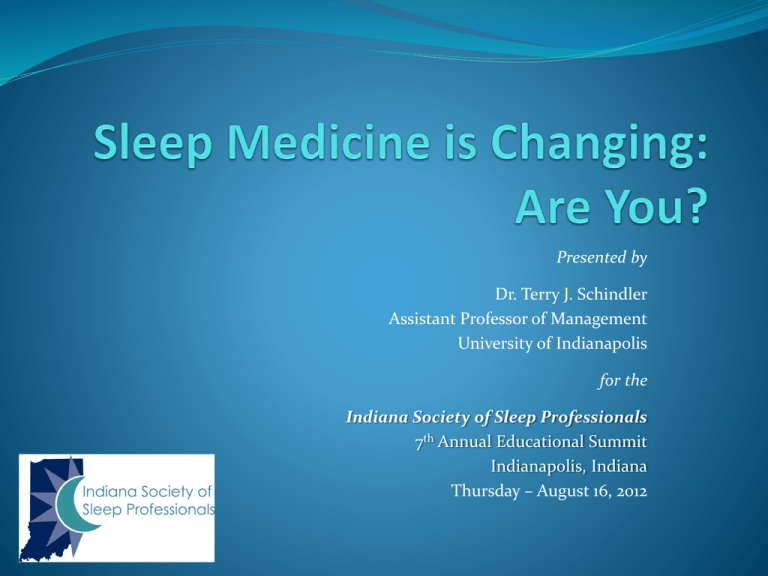
Presented by Dr. Terry J. Schindler Assistant Professor of Management University of Indianapolis for the Indiana Society of Sleep Professionals 7th Annual Educational Summit Indianapolis, Indiana Thursday – August 16, 2012 Session Expectations/Objectives Discuss the changes in sleep medicine Discuss the changes in you Mix in a little theory Provide a little Freducation* Have a little Fun *Adapted from: The Fred Factor by Mark Sanborn. A Currency Book Published by Doubleday, 2004 Exercise One: Patient Expectations Patient Expectations: In the Past? Presently? In the Future? My Preparation to Meet Patient Expectations: In the Past? Presently? In the Future? Question What do you need/want to make a difference and meet, in fact exceed patient expectations? Customer [Patient] Satisfaction In his book, The Speed of Trust, Steven H.R. Covey Jr. links trust, time and cost. As trust goes down, speed goes down and costs go up; as trust goes up, speed goes up and costs go down. Trust Patient Satisfaction Employee Satisfaction The Fred Factor The Mission: Be a Fred...continually create new value for those you live and work with through dedication, passion and creativity. The Four Principles: 1. 2. 3. 4. Everyone makes a difference. Everything is built on relationships. You must continually create value for others, and it doesn’t have to cost a penny. You can reinvent yourself regularly. *Adapted from: The Fred Factor by Mark Sanborn. A Currency Book Published by Doubleday, 2004 The Four Principles 1. Everyone makes a difference. “Nobody can prevent you from choosing to be exceptional” It’s a matter of attitude The only question at the end of the day is “What kind of difference did you make?” Ask yourself an additional question: Will what I say or do today, be that patient’s event of the day? *Adapted from: The Fred Factor by Mark Sanborn. A Currency Book Published by Doubleday, 2004 The Four Principles 2. Everything is built on relationships. Go beyond simply interacting with customers [patients] and colleagues to build relationships. Service becomes personalized when a relationship exits between the provider and the customer [patients] Take the time to get to know the patient and understand his/her needs and preferences Win the “Moments of Truth” Source: Jan Carlzon *Adapted from: The Fred Factor by Mark Sanborn. A Currency Book Published by Doubleday, 2004 The Seven Bs of Relationship Building 1. 2. 3. 4. 5. 6. 7. Be real. Be interested (not just interesting). Be a better listener. Be empathic. Be honest. Be helpful. Be prompt. *Adapted from: The Fred Factor by Mark Sanborn. A Currency Book Published by Doubleday, 2004 The Four Principles 3. You must continually create value for others, and it doesn’t have to cost a penny. You can replace money with imagination. The objective is to outthink your competition rather than outspend them. Create value for patients without spending more money to do it Ask yourself the question: How can I make what I do extraordinary? Create the Wow! Compete against your own potential everyday *Adapted from: The Fred Factor by Mark Sanborn. A Currency Book Published by Doubleday, 2004 Adding Value: Examples Tell the truth. Practice personality power. Meet needs in advance. Add good stuff (enjoyment, enthusiasm, humor). Subtract bad stuff (waiting, defects, mistakes, irritation and frustration, misinformation). 6. Simplify. 7. Improve. 1. 2. 3. 4. 5. *Adapted from: The Fred Factor by Mark Sanborn. A Currency Book Published by Doubleday, 2004 The Four Principles 4. You can reinvent yourself regularly. No matter what job you hold, what industry you work in or where you live in the world, you wake up every morning “tabala rasa,” with a blank slate, and you can make your business and your life anything you choose How can you bring originality to what you do? How can you reinvent yourself and your work? Brand You: Personal Brand Equity Evaluation (Tom Peters) Improve your IQ – Implementation Quotient *Adapted from: The Fred Factor by Mark Sanborn. A Currency Book Published by Doubleday, 2004 Exercise Two: “Acts of Fred” List current actions, activities or events that you feel/believe are “Acts of Fred,” performed by you or others: In the Past? Presently? In the Future? “When you don’t see much meaning in what you do, you won’t bring value to what you do.” *Adapted from: The Fred Factor by Mark Sanborn. A Currency Book Published by Doubleday, 2004 Recognize the Freds in Your Life Reflect back on your life Who have been the Freds who have made the biggest difference in your life? *Adapted from: The Fred Factor by Mark Sanborn. A Currency Book Published by Doubleday, 2004 Milkman Moe Don’t be in a rush to get away: Always have time to listen Take time to chip off a piece of ice Let the children help load the milk case and carry the empty cases You’re like one of the family Don’t ever take a problem into them Always be in good humor Sometimes you are the only one they will see in a day Milkman Moe Find out what each customer wants In hot weather, he would knock on the door and give his customers’ their milk at the door or, take it into the house and put it in the kitchen For elderly customers, along with the milk, he would take in their mail, newspaper, an armload kindling or coal The Golden Rule “Do unto others as you would have them do unto you.” The Golden Rule literally – treating people in the way you’d like to be treated – means dealing with others from your own perspective. It implies that we are all alike, that what I want and need is exactly what you want and need. The Platinum Rule “Do unto others as they’d like done unto them.” So The Platinum Rule is not at odds with The Golden Rule. Instead, you might say it’s a newer, more sensitive version. Source: The Platinum Rule Tony Alessandra, Ph.D. and Michael J. O’Connor, Ph.D. Milkman Moe Love what you do Be honest Always be in good humor. Form relationships Mr. Kannapel: “My name is on the truck.” Don’t leave anything you wouldn’t take home to your family Expectancy Theory Extrinsic – Financial Reimbursement related to Patient Satisfaction Intrinsic – Psychological Work has meaning Feeling a sense of worth, sense of purpose, sense of value True Professionalism “Professionalism is predominately an attitude, not a set of competencies. A real professional is a technician who cares.” “Professional is not a label you give yourself – it’s a description you hope others will apply to you.” Source: David H. Maister True Professionalism: The Courage to Care About Your People, Your Clients, and Your Career Touchstone, 2000 Milkman Moe Outcomes: Won 3 of every 4 sales contests No order too small “Ask mommy if she wants any ice cream.” His customers paid $1.00 more a gallon till he got his pension Treated like a friend, not a salesman Smiles from the little kids Mr. Kannapel’s son was overheard saying: “If I had one or two more like him, my dairy would still be open.” Question I’m not here to judge. You are the judge. Tomorrow; at the end of the day, if you were placed on trial for “Performing ‘Acts of Fred’ with your patients,” would there be enough evidence to convict you? *Adapted from: The Fred Factor by Mark Sanborn. A Currency Book Published by Doubleday, 2004 Are you a Fred? Take the test at www.fredfactor.com Conflict of Interest Disclosure(s) _XX_I do not have any potential conflicts of interest to disclose, OR ____I wish to disclose the following potential conflicts of interest: Type of Potential Conflict/Details of Potential Conflict ____Grant/Research Support ____Consultant ____Speakers’ Bureaus ____Financial support ____Other

